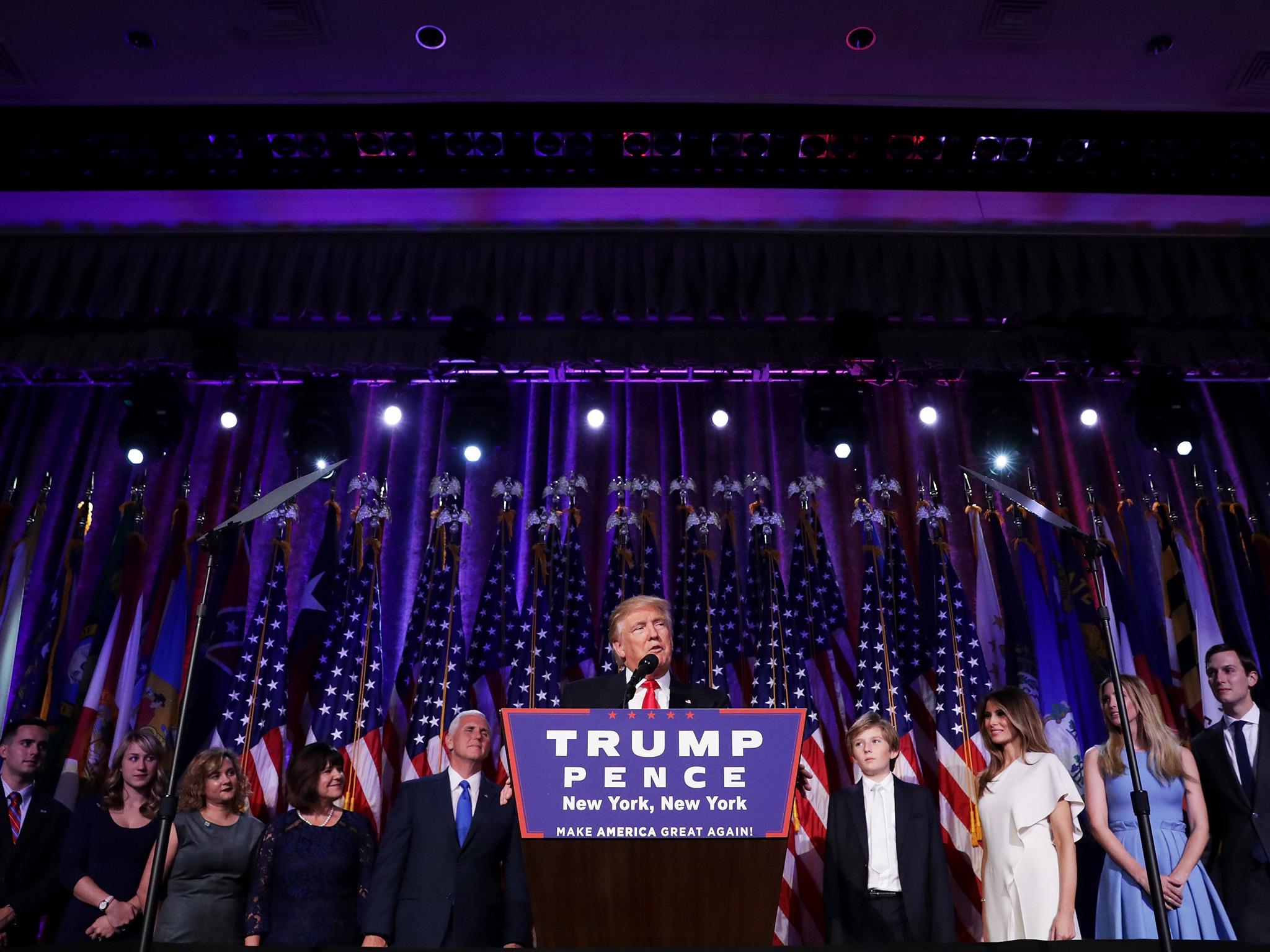President Donald Trump, Brexit, and Arab Spring: Where will the hatred of ruling elites take us all?
Resentment over inequality, unemployment and an overriding disgust of cosy leaderships were common factors in all the major grassroot backlashes of the past five years. Globalisation was meant to make us look outwards, but nations are now turning in on themselves: insularity rules

Even Donald Trump, with his penchant for exaggeration, might struggle to find the words to describe his incredible electoral triumph. Against almost every prediction the American people have handed power to a man who has no experience of public office, and whose campaign appeared largely based on sowing seeds of disunity, sprinkling them with hateful rhetoric, then watching to see what happened. Trump’s victory alone will have huge and unpredictable ramifications – for America and for the wider world. Set it in the context of what appears to be a broader collapse in the West’s liberal and democratic post-war consensus, and Trump’s march to the White House takes on an even greater significance.
When he first won the right to be the Republican Party’s presidential candidate, the idea of Trump transforming from loudmouth businessman and TV star to serious politician was met with scorn. At every turn he was pooh-poohed by political opponents, right-on celebrities and even many within his own party. The Clinton campaign spent millions more dollars; it employed a far more sophisticated infrastructure in an attempt to get the Democratic vote out. All of it was in vain: the Donald’s triumph is complete.
Lined up against the shock of today’s result in the US, June’s vote in the UK to withdraw from the European Union seems somewhat to pale. Indeed, it is perhaps easy to overstate the degree to which Brexit and Donald Trump’s victory are directly comparable. Nevertheless, it is surely undeniable that at least a portion of the respective British and American electorates were motivated by shared concerns: disgruntlement over the effects of globalisation; rising inequality; unease about immigration; and dissatisfaction with a seemingly self-perpetuating establishment. These two historic votes were both, in their own ways, a response to the same question: are you happy with the status quo? The answer now is abundantly clear on both sides of the Atlantic.
History will have its say in due course. Yet there are aspects of Trump’s victory in particular which are so remarkable and frankly so terrifying, that it may not be too soon to conclude that the world is on notice of a new era. It is not so much a question of the public defying political elites or confounding pollsters. Nor is the difference here about the ability of an outsider per se to ride to unexpected victory. Dark horses – albeit usually ones who know their way around the political course – have a longstanding record of winning the occasional race.

No, what marked out Trump’s campaign was its utter disregard not only for traditional politics, but also for any cogent sense of truth. He has lied about his opponent (claiming for instance that she would abolish the Second Amendment); he has questioned the President’s birthplace; he has told Americans that dangerous Mexicans are pouring into the US and that crime is rising. His policies, such as they are, are therefore built on a charade. In that respect, there are echoes of the way the Brexit campaign was fought, although Trump has undoubtedly been even more brazen in his economy with the truth. In the UK the Crown Prosecution Service is currently considering a complaint that Leave campaigns misled voters. There will be no such accountability for Trump.
But if Trump’s lack of truthfulness is striking, of greater note must be the very simple truth that many voters either didn’t care about the lies or preferred to believe them. What is more, they were prepared to put their faith in a man who is not only unmoved by facts but is also of dubious character. On the campaign trail he mocked a disabled reporter; he cast aspersions on John McCain’s record as a prisoner of war in Vietnam; numerous women came forward to accuse him of inappropriate behaviour including allegations of sexual assault; his past came back to haunt him with the release of his comments about how he, as a star, could treat women. The man who will be President is the same man who bragged jauntily about “grabbing women by the pussy”. Yet none of it seemed to make a jot of difference.
Some will argue – indeed, some already have – that the media failed to expose Trump’s true colours. The same accusation has been levelled at news publishers in the UK in respect of the Brexit campaign. In the latter example, there is perhaps some merit in the argument that the BBC in particular put the need for balance before credence. Even so, there were plenty of news outlets, including The Independent, which questioned many of the wilder claims by Brexit’s most ardent supporters. And during the presidential campaign, rebuttals of Trump’s myriad lies and exposés of his character flaws have been front and centre of the American media’s coverage. The point is that Trump has simply lumped in critical media voices with the wider “liberal elite” which was the focus of so many of his attacks and thus neutered the would-be watchdogs.

There is an irony here in that the rise of social media and of ultra-partisan (and wholly unaccountable) blogs and websites has made life much easier for anti-establishment conspiracy theorists such as Trump. If you want to believe his outpourings, then you’ll be able to find a “news” site somewhere which claims to prove everything he says. The internet was supposed to level the information playing field, enabling us all to become fact checkers. In fact, it has done little more than permit people to create – and “prove” – their own truths. We all thought it was only possible to propagandise a nation through the misuse of state apparatus by dictatorial regimes. It turns out the internet is the greatest propaganda tool Josef Goebbels never had.
Trump, at least, is no dictator – whatever we think of his election to the presidency; the checks and balance of the US constitution remain in place, however dominant the Republican Party may be in Congress. Nonetheless, the current which runs most strongly beneath Trumpism, and which was present during the Brexit debate too, is a kind of rank nationalism little seen in the West since the post-war settlement and the establishment both of Nato and the EU. And there may well be more of it on the way.

In the UK, racially motivated abuse of “foreigners” is on the rise. Immediately after the referendum, countless examples were heard of verbal and physical attacks both on Europeans living in this country, and British-born people from ethnic minorities. In the US, we will soon discover whether Trump makes good on his promises to build a wall along the border with Mexico and to ban Muslims from entering the country. Antipathy towards non-whites is an intrinsic part of the mindset of some Trump supporters.
In mainland Europe too, nationalism is growing stronger once again. Next year there will be elections in Germany, where the anti-immigrant AfD is hardening its powerbase, and in the Netherlands, where right-winger Geert Wilders and his Freedom Party have hopes of forming a government. Wilders is currently on trial for discrimination and inciting racial hatred against Moroccans living in Holland; he has boycotted the proceedings and has demanded that one of the judges hearing his case be removed because of his biased attitude. (Criticism of the judiciary’s independence, heard in the UK too last week, yet again taps into the anti-élites, anti-experts narrative we have heard so often from the likes of Trump and Nigel Farage.)
In France, where anti-immigrant feeling is arguably running higher than anywhere else in Western Europe, Marine Le Pen will also test the electoral system in 2017. This morning she sent delighted messages to Trump, congratulating the American people on having set themselves “free”. The Front National’s deputy president, Florian Philippot, added that the result was – after Brexit – another defeat for a mysterious global “oligarchy”.
The line from Brexit to Trump therefore has the potential to extend much further into the future. Does the line also extend back into the immediate past though? It is an odd association, but consider the uprisings which together constituted the Arab Spring. Those popular expressions of disgust against ageing autocrats were welcomed in the West: they were apparently attempts to overthrow years of absolutist government and, to our eyes, replace them with western-style liberal democracies. But in fact many of the causes of resentment among the populations of Tunisia, or Egypt, or Syria, or Libya were not wholly distinct from the concerns of Trump supporters: inequality, unemployment, and an overriding hatred of ruling elites.
The roots of globalisation may have been firmly planted; institutions such as the United Nations, which symbolised the world’s apparently shared ideals have become in turn the guardians of the current international order. But in many places which once seemed so committed to reaping globalisation’s fruit, the gaze is no longer outward, welcoming, progressive. Instead, nations are looking to, and turning in on, themselves. Insularity rules. What, in the end, will become of us all?
Join our commenting forum
Join thought-provoking conversations, follow other Independent readers and see their replies
Comments
Bookmark popover
Removed from bookmarks